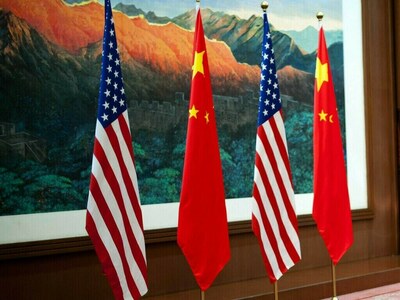US and Chinese Officials Meet in London to De-escalate Trade Tensions
Senior officials from the United States and China convened in London on Monday, aiming to resolve a significant trade disagreement. The dispute, initially centered on reciprocal tariffs, has expanded to include restrictions on rare earth minerals, posing a threat to global supply chains and economic growth.
The discussions between the two major economic powers took place at Lancaster House, with the goal of revitalizing a preliminary agreement established the previous month in Geneva. This earlier agreement had provided a temporary reduction in tensions between Washington and Beijing. However, the U.S. has since accused China of delaying the fulfillment of its commitments, particularly concerning the delivery of rare earth elements. Kevin Hassett, a U.S. economic advisor, stated that the U.S. delegation sought assurances from China regarding rare earth minerals, following a conversation between Presidents Donald Trump and Xi Jinping the previous week.
“The objective of today’s meeting is to ensure their commitment and secure concrete assurances,” Hassett, the director of the National Economic Council, mentioned in a television interview. He indicated that the expectation was for export limitations to be promptly eased and for substantial quantities of rare earth minerals to be released following these assurances.
These discussions, potentially extending into Tuesday, occur at a pivotal moment for both economies. Investors are seeking respite from the tariffs imposed by President Trump since his return to the White House earlier this year.
China’s export growth experienced a slowdown to a three-month low in May, while its factory-gate deflation worsened to its lowest level in two years.
In the U.S., the trade conflict has significantly impacted business and consumer confidence. The gross domestic product contracted in the first quarter due to a substantial increase in imports, as consumers accelerated purchases to avoid anticipated price increases.
However, the impact on inflation has been limited thus far, and the labor market has remained relatively stable. Economists anticipate that vulnerabilities may become more apparent during the summer months.
The U.S. delegation attending the discussions in London includes Treasury Secretary Scott Bessent, Commerce Secretary Howard Lutnick, and U.S. Trade Representative Jamieson Greer. The Chinese delegation is being led by Vice Premier He Lifeng.
The participation of Lutnick, whose agency oversees U.S. export controls, highlights the critical importance of rare earth minerals. China possesses a significant share of the rare earth magnet market, a vital component in electric vehicle motors.
Lutnick was not present at the Geneva talks, where the countries reached an initial agreement to partially reverse some of the significant tariffs imposed on each other.
This second round of meetings occurs shortly after Trump and Xi spoke via telephone, their first direct interaction since Trump’s inauguration. During the extended call, Xi urged Trump to withdraw from trade measures that have destabilized the global economy and cautioned against potential actions regarding Taiwan. Trump noted that the discussions primarily addressed trade and led to “a very positive conclusion,” paving the way for the meeting in London. Trump later mentioned that Xi had agreed to resume shipments of rare earth minerals and magnets to the U.S. It was reported that China had granted temporary export licenses to rare-earth suppliers of major U.S. automakers. China’s decision in April to halt exports of a range of critical minerals and magnets disrupted the supply chains crucial to automakers, aerospace manufacturers, semiconductor companies, and military contractors worldwide.



Comments (0)
No comments yet. Be the first to comment!
Leave a Comment